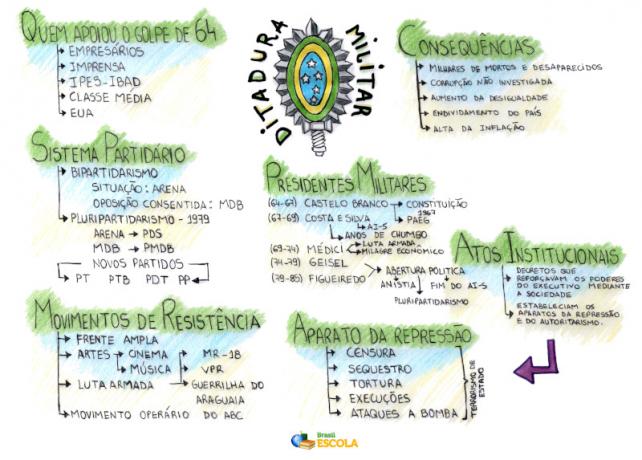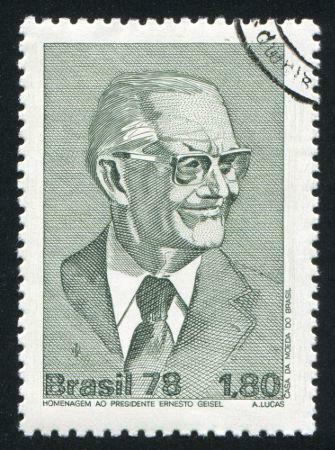Military dictatorship is the political regime in which members of the armed forces of a country centralize politically and administratively the State power in their hands, denying most citizens the participation and decision-making in the institutions state-owned companies.
military dictatorship in Brazil
In Brazil, the most recent period of military dictatorship occurred between 1964 and 1985. With the argument of avoiding the realization of a dictatorship communist in Brazil, during the Cold War, the Brazilian Armed Forces carried out a coup d'etat on March 31, 1964, who deposed the president João Goulart. Elected as vice president in 1960, Jango (as he was known) assumed power after the resignation of Jânio Quadros in 1961.

Tanks patrol the Esplanade of Ministries in Brasília
(acquis Federal District Public Archive)
Read too: What is a coup d'état?
Defended by the military as a revolutionary action, the dictatorship that prevailed in Brazil can be characterized as a civil-military dictatorship
. This is due to the effective participation of important sectors of the Brazilian business community, especially those linked to the country's large banks and industrial federations.Mind Map: Military Dictatorship
 ?
?
*To download the mind map in PDF, Click here!
Consequences of the military regime in Brazil
THE civil-military dictatorship in Brazil it was marked by the extreme violence with which opponents of the regime were fought. Arbitrary arrests, torture, rapes and murders were carried out by the military and police forces in the country. From the first moment, political rights were revoked, instituting a strict censorship to the different means of communication and to the literary and artistic expression of the population.
Read too: What is military intervention?
Institutional Acts
Through the Institutional Acts, the five effective presidents of the period – Castelo Branco, Costa e Silva, Médici, Geisel and João Figueiredo – governed in many moments without the approval of the National Congress. And even when it worked, it was dominated by the National Renewal Alliance (Arena), the party that supported the regime, despite there being an opposition party, the Brazilian Democratic Movement (MDB).
Do not stop now... There's more after the advertising ;)
Read too: AI-5: the Institutional Act that suspended political rights
Brazil's economy in the civil-military dictatorship
Economically, Brazil has experienced intense economic, industrial and agricultural growth, especially in due to the large sum of investments made by the State and foreign companies, which became known like Brazilian economic miracle. However, there was also a great repression of workers' movements, which kept wages low, as the possibilities of demand were minimal. Furthermore, this growth has not resulted in an income distribution; on the contrary, during the military dictatorship the concentration of income in the hands of the richest grew in the country.
 ?
?
Ernesto Geisel was one of the general-presidents during the military regime in Brazil
(Image credits: Shutterstock and rook76)
Process of Resuming Democracy
From 1974 onwards, a process of “slow and gradual opening” was initiated, which aimed to restore the political freedoms of representative democracy. In 1979, was decreed a amnestyto political prisoners and exiles, also allowing the formation of new political parties. In 1978, intense strikes took place in the ABC region of São Paulo, which greatly contributed to the weakening of the regime.
Read too: What is democracy?
The final exhaustion of the military regime happened, mainly, as a result of the realization of numerous mass demonstrations in major Brazilian cities calling for direct elections for president of the Republic. Carried out by millions of people, these demonstrations became known as Direct now.
Despite the expression of popular interest, the military did not hold a direct election. In 1984, Tancredo Neves was elected president of Brazil by the Electoral College. However, his death shortly before the inauguration led to the government of José Sarney, Brazil's first civilian president after 21 years of civil-military dictatorship.
By Me. Tales Pinto
*Mental Map by Daniel Neves
Graduated in History
Would you like to reference this text in a school or academic work? Look:
PINTO, Tales of the Saints. "What is a military dictatorship?"; Brazil School. Available in: https://brasilescola.uol.com.br/o-que-e/historia/o-que-e-ditadura-militar.htm. Accessed on June 27, 2021.

